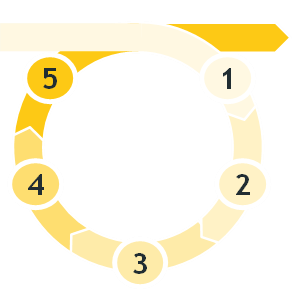CIRCULAR GROWTH MINDSET
Services to achieve sustainability maturity level 5
Probably the biggest challenge on the path to becoming a circular company is creating the right culture to generate new, meaningful business models. Our Circular Growth Mindset services help you to create the right mindset and governance as well as self-optimizing process and organizational structures.
→ Services maturity level 2 and 3
→ Services maturity level 4
→ Sustainability maturity levels

Impact, Risk & Opportunity (IRO) management
Do you know your key sustainability issues – the impact of your company on the environment and society and the impact of the current changes caused by the multiple crisis landscape on your company? IRO management is the central process that enables you to manage your material risks and exploit your greatest opportunities in the area of sustainability for the future development of your organization.
Challenges
Quantitative and qualitative requirements of guidelines and regulations such as CSRD / SEC / ISSB / TCFD / …* such as double materiality, number of data points or consistent verification management require an effective and efficient approach to managing impacts, risks and opportunities.
Core questions
- How do we meet the requirements of CSRD / SEC / ISSB / TCFD / …?
- How do we implement an effective process to monitor and manage impacts, risks and opportunities related to sustainability issues?
- How do we reduce the effort for reporting and verification?
* CSRD: Corporate Sustainability Reporting Directive /
SEC: Securities and Exchange Commission (USA) /
ISSB: International Sustainability Standards Board /
TCFD: Task force on Climate related Financial Disclosures
Solution approach*

- Implement IRO-management
Definition and establishment of a process for IRO management.
Identify IRO
Identification of the key IROs with the involvement of all stakeholders.Analyse and evaluate IRO
Determining the importance and prioritization of the IRO.Determine how to deal with IROs
Definition of the control strategy.- Monitor, control and report IRO
Taking measures in relation to material IROs.
*the approach must be adapted to the company-specific framework conditions in each case
Benefits
Fulfillment of requirements for companies in the preparation and disclosure of, for example, CSRD / SEC / ISSB / TCFD* information and proactive corporate management.
Key results
- Materiality matrix: Portfolio for monitoring and managing material sustainability issues.
- Risk matrix: Knowledge and control of the greatest risks and problems in relation to sustainability issues.
- Opportunity matrix: Knowledge and seizing of the greatest opportunities for optimizing the existing business model or disrupting it.
* CSRD: Corporate Sustainability Reporting Directive /
SEC: Securities and Exchange Commission (USA) /
ISSB: International Sustainability Standards Board /
TCFD: Task force on Climate related Financial Disclosures
Workshop, training & coaching portfolio
Unleash the intrinsic motivation of your workforce with customized workshops, training and coaching in the areas of sustainability, ESG (environmental, social and governance), circular economy and agility.
Challenges
Effectively developing motivated employees, resolving resistance within your own workforce and creating a critical mass as quickly as possible so that sustainability becomes a sure-fire success.
Core questions
- Sustainability: How do we create an awareness of the importance of ecological and social aspects of corporate management and deepen this in the long term?
- Agile scaling: How do we create an agile circular mindset to accelerate change towards a sustainable circular economy?
- Leaders: How do we strengthen the talent of our leaders to inspire and motivate sustainable action?
- Workshops & coaching: How do we lead our workforce and managers towards sustainable impact and goal achievement?
Solution approach*
![]()
- Determine training and coaching needs
Determine the scope, target group and objectives of training and coaching and define training requirements. - Develop the training
Design training, prepare training documents and trainer guidelines and make them available. - Execute the training
Enable and ensure training registration. Hold training sessions and respond flexibly to change requests. - Follow up on training content
Obtain feedback on the training. Check the application and implementation of the training content.
*the approach must be adapted to the company-specific framework conditions in each case
Benefits
Raising awareness of challenges and solutions in sustainability as well as future-proof positioning through the development of key core competencies.
Key results
- Increasing employer attractiveness
- Increasing employee motivation
- Trained employees and managers in key areas of sustainability expertise

